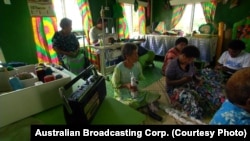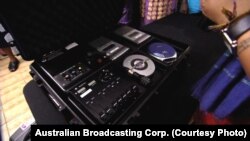Fiji’s tropical climate, white sand beaches and mountain backdrops create a veritable paradise for travelers. But gender disparities – in areas such as paid work and political office – foster an environment far less appealing for females who live there.
The South Pacific island nation of 893,000 has a strong patriarchal society and governance. It ranked a lowly 122 out of 142 countries in the World Economic Forum’s 2014 global gender gap index.
"Decisions aren’t being made for or by women," said Sharon Bhagwan-Rolls, a Fiji islander and activist. "... That’s a big problem politically."
She’s been working to change that. In 2004, the former broadcast journalist co-founded FemLINKpacific, a nonprofit media organization that operates two radio stations and other outlets to help amplify the voices of women, especially the poor and disadvantaged.
FemLINKpacific offsets the "poverty of information" on commercial radio, where the closest thing to coverage of women’s issues is "personalities reading recipes," said Bhagwan-Rolls, the organization’s coordinator.
The women-led FemTALK 89 FM station broadcasts around the clock, reaching a 20-mile radius from Suva, the capital city. "Government officials, or anyone who wants to know what is the situation of women of all diversities, can tune in," Bhagwan-Rolls said. A second FemTALK station operates 10 a.m. to 2 p.m. weekdays from Lumbasa, Vanua Levu, Fiji’s second-largest island.
Collecting stories
FemLINKpacific has trained approximately 30 young volunteers in radio production, sending them out in teams to make recordings for later broadcast. They use "suitcase radio" kits, with a main console, a gooseneck microphone, two tape recorders and two CD players.
"We have taken this across Fiji, around the main island [of Viti Levu] as well as Vanua Levu and into the community, so you can literally pick it up and take it on a plane or put in a boat," Bhagwan-Rolls said.
A production team recently visited Namotomoto, a village on the island of Nadi, and set up at its new Women’s Resource Center. The government-funded center promotes women’s economic development, supplying sewing machines at which women make school uniforms to sell. It also offers programs on financial literacy, hygiene, reproductive health and other topics.
Women can speak freely at the center, unlike in village government meetings, said Sereima Lutumailagi, president of the Namotomoto Women’s Club and its 40-plus members.
"We always respect the elders. We always respect the chief in our own village. But, when they talk, we have to keep our mouths shut," Lutumailagi complains. "We want to be empowered.... We got talent. We can talk. We can raise our voice[s] to be heard – by the villagers or by the government."
With the help of radio and Bhagwan-Rolls, the club successfully pressured the local government to restore the center’s water after cutting it off for several days over an unpaid bill, Lutumailagi said. "Sharon is so helpful! I really love Sharon."
Building bridges, setting agendas
Bhagwan-Rolls sees the radio collaboration as essential.
"Particularly in rural centers, you can feel so isolated," Bhagwan-Rolls said in a later phone interview with VOA. She mentions a widowed farmer named Nancy, who called into a recent FemTALK program to complain about the distance to health care centers. "Most people don’t have their own cars, and public transportation is not regular," so people either must arrange expensive travel or forego a clinic visit.
The radio programming serves as a bridge – building community and bringing island women’s priorities to the attention of lawmakers locally and in the capital city, Suva.
It’s also a blueprint for advocacy and action.
"We’re able to demonstrate, by collecting stories from rural centers, that these are the needs, whether it’s about health or economic security," said Bhagwan-Rolls. "That becomes the basis of our policy advocacy."
As she said earlier, "When you connect it all, it’s a national agenda."
Improving political representation
A key agenda item is to address the gender imbalance in local governments. "We’re still not seeing women’s leadership being integrated into the government," Bhagwan-Rolls said.
Fiji, freed of British rule in 1970, since then has experienced several coups, most recently in 2006. Tensions between indigenous people and ethnic Indians fueled political instability, and the country didn’t hold a national election for another eight years.
Through the radio, "we were still able to connect rural women to some of the national processes and ensure that women’s voices were heard in a very difficult political time," Bhagwan-Rolls points out. The 2014 election raised the number of women in parliament to eight out of 50, or 16 percent, up from 11 percent in 2006.
FemLINKpacific also is working with correspondents elsewhere in the South Pacific, including the Marshall and Solomon Islands, Papua New Guinea, Tonga and Vanuatu.
FemLINKpacific is part of a broader effort to build civil society, says Bhagwan-Rolls, a member of the international NGO Working Group on Women, Peace and Security. She chairs the Global Partnership for the Prevention of Armed Conflict. And in October, she’ll become board president of the Global Fund for Women, a foundation that supports women’s human rights.
Bhagwan-Rolls also serves on an advisory board for U.N. Women, an organization promoting gender equality. She’d been galvanized into activism at the 1995 United Nation’s fourth world conference on women, when she was a young journalist sent to Beijing as a delegate.
Now she’s connecting some of FemLINK’s young producers with others on the international stage, providing opportunities for them and FemLINK audiences. "For me, it’s about how do we make Pacific problems and realities visible," she explains. "Then we connect it back to the women in our network.
"Our local community broadcast is an important reminder of women’s capacity," Bhagwan-Rolls adds. "... What we keep bringing forward is not just the problems that women see but that they have solutions. When you provide a broadcasting space, you support women’s political agency."






